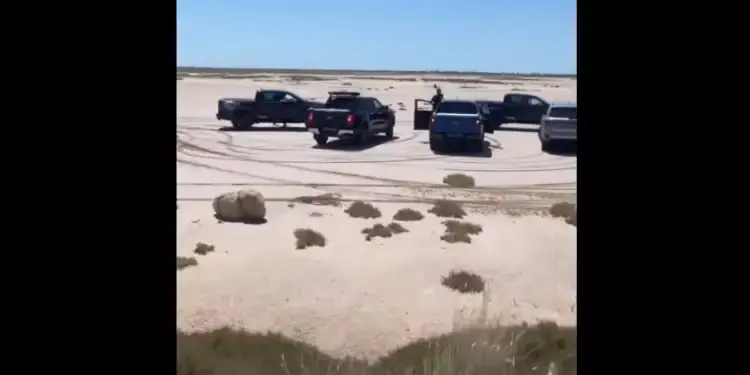A ballet of 4 × 4 vehicles on a background of drift and dust, in the heart of the salt marshes of Kerkennah. This show recently organized by Ford Tunisia, however takes place in one of the most fragile and rich ecosystems in Tunisia.
Classified wetlands protected by the Ramsar Convention since 2012, these areas are today threatened by motorized practices that go against the country’s ecological commitments.
The warning cry was launched by many defenders of the ecological cause in Tunisia, including the well -known The Dreamer. The islands of Kerkennah are not simple sandy beaches or adventure tracks. They house coastal wetlands, sanctuaries for many migratory species and sensitive natural habitats. As such, they are recognized internationally and subject to strict protection rules.
Putting all-terrain vehicles in these environments to destroy their biological balance: soil compaction, disturbance of wildlife, destruction of flora and sound pollution accumulate. The Drift, even in a promotional framework, in a natural environment is not a trivial leisure; It is a factor of environmental stress, especially in an archipelago as vulnerable as Kerkennah.
Recall that on April 5, 2025, a joint decree of interior, agriculture, environment and fishing ministries explicitly prohibited motorized activities (4 × 4, motorcycles, quads) on beaches, dunes and coastal areas. The objective: to preserve these natural spaces against intensive and destructive uses.
The holding of this demonstration in Kerkennah – without apparent authorization and in flagrant contradiction with this decree – question: where did the authorities go?
What is the Ramsar Convention?
Some online publications suggest a direct presence of Ford Tunisia, via the use of brand vehicles and the participation of influencers visible on networks. Even if the company did not officially react, it was content to remove the Instagram stories from the event.
The Ramsar Convention, adopted in 1971, aims to preserve wetlands, essential to the ecological balance of the planet. These natural environments – marshes, lagoons, saltworks, deltas – play a vital role in the regulation of water, the reception of migratory birds, biodiversity and the fight against the effects of climate change. By joining this agreement, Tunisia is committed to protecting these fragile spaces, ensuring sustainable management and avoiding any activity that could compromise its balance.
The islands of Kerkennah are home to several coastal wetlands of great ecological value, including saline and muddy beaches rich in biodiversity. In 2012, the whole archipelago was registered on the Ramsar list, which gives them international protection status.
This classification recognizes the importance of Kerkennah as a refuge for migratory birds, marine biodiversity reservoir and buffer against erosion and climate change. As such, any activity likely to disturb these environments – such as motorized vehicle races – is strictly discouraged, even prohibited. The preservation of Kerkennah, already threatened by the rise of waters and human activity, is therefore an environmental priority for Tunisia.








